Overview of the lectures at the Žarana Papić School of Feminism: 3 October 2015
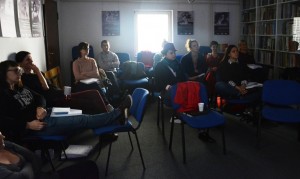 On Saturday, 03/10/2015 the first round of lectures of Module 4 at the Žarana Papić School of Feminism took place – Feminist ethical and political theory. The lecturers and leads of the Module 4 are Tijana Okić, MA of philosophy and teaching assistant at the Faculty of Philosophy in Sarajevo, and Amila Ždralović, MA of sociological sciences and teaching assistant at the University of Sarajevo Law Faculty.
On Saturday, 03/10/2015 the first round of lectures of Module 4 at the Žarana Papić School of Feminism took place – Feminist ethical and political theory. The lecturers and leads of the Module 4 are Tijana Okić, MA of philosophy and teaching assistant at the Faculty of Philosophy in Sarajevo, and Amila Ždralović, MA of sociological sciences and teaching assistant at the University of Sarajevo Law Faculty.
Tijana Okić started the introductory lecture by critically reviewing the second wave feminism, as well as the historical-materialistic perspective of the feminist contribution to ethical and political theory and, in that context, emphasized the inseparability and overlapping of ethics and politics, because politics largely has ethical implications. During the first part of the lecture, the participants were offered a theoretical frame for thinking about the feminist critique of the so called contractual theories, as well as the terms justice, equity, concern, feminisation, labour force, capitalism, productive and reproductive work.
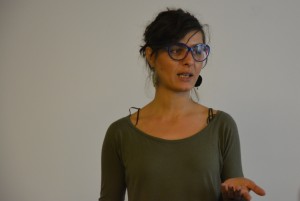
The lecturer talked about the points of discordance within different feminism theories of the second wave of feminism and, in that context, emphasized that feminism should be the idea of a mass movement, instead of being exclusive only in the domain of the work of specific feminists. The participants reviewed the text “Feminism, capitalism and the artifice of history” by Nancy Fraser, in the context of denoting the main issues within different theories of the second wave of feminism. The lecturer also introduced the term class, and explained the dynamic of class as one of the central terms of left feminism.
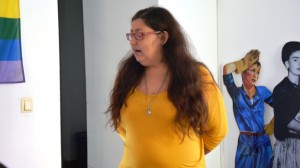 In the scope of her lecture (Feminism, post-structuralism and critical theory: the problem of the political subject), Amila Ždralović introduced the participants to the relation between feminism, post-structuralism and critical theory, in the context of the issue of the (political) subject. There was talk about the influence of post-structuralism on the feminism theory, as well as about how post-structuralism deconstructs and dematerialises the position of subject. There was also talk about the postmodern interpretations of identity and subjectivity that deconstruct the inflicted categories of collective identity, including the main subject of feminist theories and movements.
In the scope of her lecture (Feminism, post-structuralism and critical theory: the problem of the political subject), Amila Ždralović introduced the participants to the relation between feminism, post-structuralism and critical theory, in the context of the issue of the (political) subject. There was talk about the influence of post-structuralism on the feminism theory, as well as about how post-structuralism deconstructs and dematerialises the position of subject. There was also talk about the postmodern interpretations of identity and subjectivity that deconstruct the inflicted categories of collective identity, including the main subject of feminist theories and movements.
In the scope of the third theme (Feminism/feminisms. The left and feminism – Marxist, socialist, materialist. State feminism versus left feminism), Tijana Okić started the lecture by recognizing the general NGOisation of feminism, its remarking, so that today we are witnessing the privatisation of the feminism movements that make a class for itself. A discussion about the relation of feminism – feminisms was opened, as well as about the several mutually opposing streams within feminism as a theory and a movement. The discussion was directed towards the distinction between the streams within the second wave of feminism: liberal that developed within the frame of the system, radical that directed its attention towards the relation between the oppression of women and patriarchy, socialist that was based on the critique of capitalism and Marxism, materialist, and Marxist that expands the Marxist categories and criticizes the capitalist oppression of women.
On Saturday, 10 October the lectures of Module 4 start at 12 P.M.. Amila Ždralović will speak about the feminist critique of the (neo)liberal theories of justice. Tijana Okić will speak about the feminist critique of political economy, productive and reproductive work, and about the feminist perspectives towards nationalism and political economy.
The realisation of the Žarana Papić School of Feminism is being financially supported by the Swedish Government via the Swedish International Development Cooperation Agency (Sida).
thesecondsemesteržaranapapićschooloffeminism
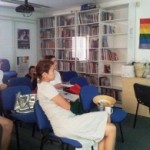 Overview of the lectures at the Žarana Papić School of Feminism: 19 September 2015
Overview of the lectures at the Žarana Papić School of Feminism: 19 September 2015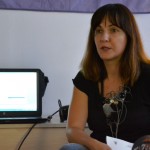 Overview of the lectures at the Žarana Papić School of Feminism: 5 September 2015
Overview of the lectures at the Žarana Papić School of Feminism: 5 September 2015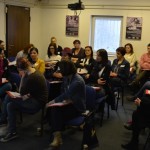 Announcement and Syllabus of the second semester of the Žarana Papić School of Feminism
Announcement and Syllabus of the second semester of the Žarana Papić School of Feminism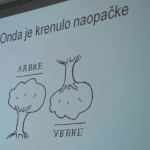 What can we expect in the second semester of the Žarana Papić School of Feminism
What can we expect in the second semester of the Žarana Papić School of Feminism